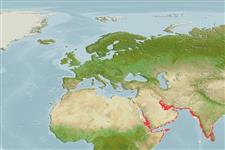Teleostei (teleosts) >
Eupercaria/misc (Various families in series Eupercaria) >
Nemipteridae (Threadfin breams, Whiptail breams)
Etymology: Scolopsis: Name from the Greek masculine noun 'skolos' meaning 'thorn' and suffix '-opsis' (from Greek feminine n. 'opsis' meaning 'aspect', 'appearance') meaning ‘thorny appearance’ presumably referring to 'les dentelures de la préopercule, en ont aussi, et même d'épineuses, aux sous-orbitaires' mentioned by Cuvier (1814) in his designation of the genus. Name ending in -'opsis' are treated as feminine according to ICZN 1999: Article 30.1.2 (Ref. 130620).
More on author: Cuvier.
Environment: milieu / climate zone / depth range / distribution range
Ecology
Marine; reef-associated; depth range 20 - 50 m (Ref. 28016). Tropical; 31°N - 5°N, 31°E - 82°E (Ref. 3810)
Western Indian Ocean: Red Sea, Gulf of Aden, Gulf of Oman, Persian Gulf, Arabian Sea and Sri Lanka (Gulf of Mannar). This species has been misidentified as Scolopsides rupellii (=Scolopsis vosmeri) or as Scolopsis phaeops (= Scolopsis frenatus) by some authors.
Length at first maturity / Size / Weight / Age
Maturity: Lm 19.8 range ? - ? cm
Max length : 36.0 cm TL male/unsexed; (Ref. 11441); common length : 20.0 cm TL male/unsexed; (Ref. 5450)
Dorsal spines (total): 10; Dorsal soft rays (total): 9; Anal spines: 3; Anal soft rays: 7. Head scales reaching forward to or just in front of level of anterior margin of eyes. Lower limb of preopercle scaly. Antrorse (forward-directed) suborbital spine absent. Pelvic fins long, reaching to level of anus. Axillary scale absent. Color: Upper body greenish-olive, whitish below. A narrow whitish stripe along base of dorsal fin. Another prominent black dark brown or black streak above lateral line beginning below about the third or fourth dorsal spine and ending on caudal peduncle. A bright blue stripe from eye to upper jaw and from posterior edge of the eye to base of pectoral fin, where it ends in a blue spot.
Commonly found associated with reefs (Ref. 30573).
Life cycle and mating behavior
Maturity | Reproduction | Spawning | Eggs | Fecundity | Larvae
Russell, B.C., 1990. FAO Species Catalogue. Vol. 12. Nemipterid fishes of the world. (Threadfin breams, whiptail breams, monocle breams, dwarf monocle breams, and coral breams). Family Nemipteridae. An annotated and illustrated catalogue of nemipterid species known to date. FAO Fish. Synop. 125(12):149p. Rome: FAO. (Ref. 3810)
IUCN Red List Status (Ref. 130435: Version 2024-1)
Threat to humans
Harmless
Human uses
Fisheries: subsistence fisheries
Tools
Special reports
Download XML
Internet sources
Estimates based on models
Preferred temperature (Ref.
123201): 24.4 - 29.2, mean 26.4 °C (based on 59 cells).
Phylogenetic diversity index (Ref.
82804): PD
50 = 0.5000 [Uniqueness, from 0.5 = low to 2.0 = high].
Bayesian length-weight: a=0.01660 (0.00747 - 0.03689), b=2.98 (2.81 - 3.15), in cm total length, based on LWR estimates for this Genus-body shape (Ref.
93245).
Trophic level (Ref.
69278): 4.6 ±0.09 se; based on food items.
Generation time: 1.8 ( na - na) years. Estimated as median ln(3)/K based on 2
growth studies.
Resilience (Ref.
120179): Medium, minimum population doubling time 1.4 - 4.4 years (tm=1.1; Tmax=5; K=1.17).
Fishing Vulnerability (Ref.
59153): Low vulnerability (18 of 100).
Climate Vulnerability (Ref.
125649): Very high vulnerability (87 of 100).
Nutrients (Ref.
124155): Calcium = 66.5 [39.1, 137.1] mg/100g; Iron = 0.825 [0.394, 2.020] mg/100g; Protein = 19.2 [17.3, 20.9] %; Omega3 = 0.147 [0.085, 0.255] g/100g; Selenium = 43 [24, 80] μg/100g; VitaminA = 36.2 [10.1, 110.1] μg/100g; Zinc = 1.29 [0.88, 1.89] mg/100g (wet weight);
